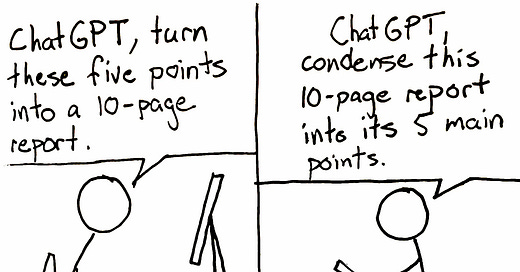Hey Honey,
We’re back! We made it through a wave of illnesses, the last vestiges of a long, cold, lonely winter. Maybe we should have delegated Hey Honey to ChatGPT?

Of course I’m joking, but I’ve been thinking a lot lately about how AI chatbots and image generators have seized the world by the neck. The tech industry has turned itself in knots over the past two years, and everything I do now at my job now involves some kind of AI. And it makes sense: you can give ChaptGPT a bulleted list and it will spit out full, understandable paragraphs hitting all the points you wanted.
At first, I was fearful that AI was going to wreck the world. Countless times, society has jumped at the chance to replace craftspeople and artists with technology, sometimes without most of us even noticing. We replaced wood furniture with particle board. We replaced stone masonry with concrete. We replaced wedding bands with DJs.
This time, I feared that journalism and entertainment would be completely automated away — that media outlets and Hollywood studios would fire their journalists and writers and replace them with ChatGPT. I wasn’t the only one who feared this; this concern was one of the biggest points of contention in the writers strike.
But I’m noticing a trend here that is making me much more optimistic. As companies try to use AI to replace more of the arts, particularly literature, visual art, and music, it’s not catching on in the ways I expected.
Years ago — way before ChatGPT or Midjourney — I had a manager who was wildly optimistic about the prospect of AI. During lunch one day, he asked me what I thought would be the impact of AI on music, knowing I was a musician and a tech nerd. Our conversation went something like this:
“Nothing,” I replied, naively.
“Really? I just don’t see why we can’t just use AI to make music,” he replied.
“But that’s not the point of music. The point of music is to make human connections. Sure, it might be nice to have generated elevator music or as a soundtrack while you work, but music matters to me because it gives me an emotional connection to the artist.”
“But there’s such a flood of music — especially pop music — it could be completely automated and fine-tuned exactly to each person’s tastes,” he replied.
“If we all had our own feed of unique music, we would lose the chance to connect with others on the music we love. These are the reasons people go to concerts — to make connections with the performer and others.”
As I watch how AI gets used in writing, art, graphic design, etc., I’m noticing that many people can quickly recognized AI-generated stuff, and put it on a lower tier than human-made stuff. Overall, I’m seeing that people value human-made art and seek it out still, for the reasons I told my boss years ago. We want to connect to others. Human connections and sharing the human experience matters in our writing, our art, and our music.
To be clear, jobs are being lost to AI; it’s just not the total replacement I think we feared. As economist Richard Baldwin put it, “AI won’t take your job. It’s somebody using AI that will take your job.” I was foolish to think that AI would have zero impact on music or writing. But it’s becoming a tool that augments human ability, rather than replacing it. Whether that remains the case in the coming years, I’m not sure. But I remain optimistic.
Love,
Mike



